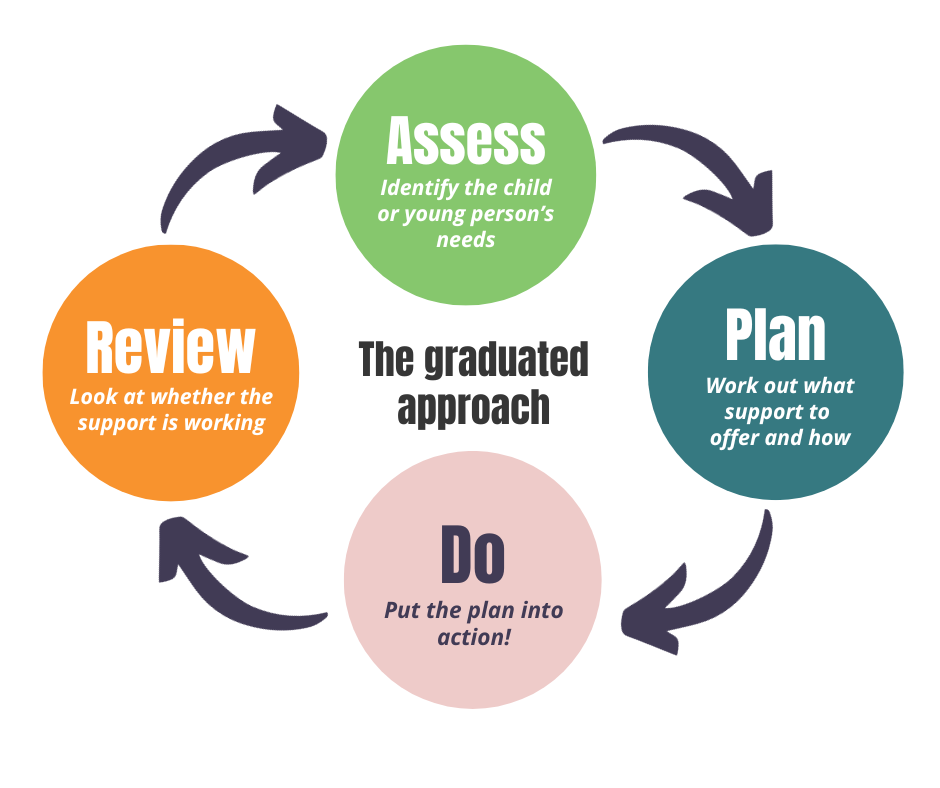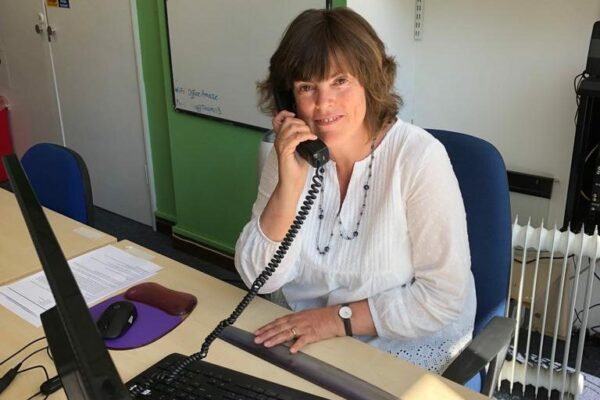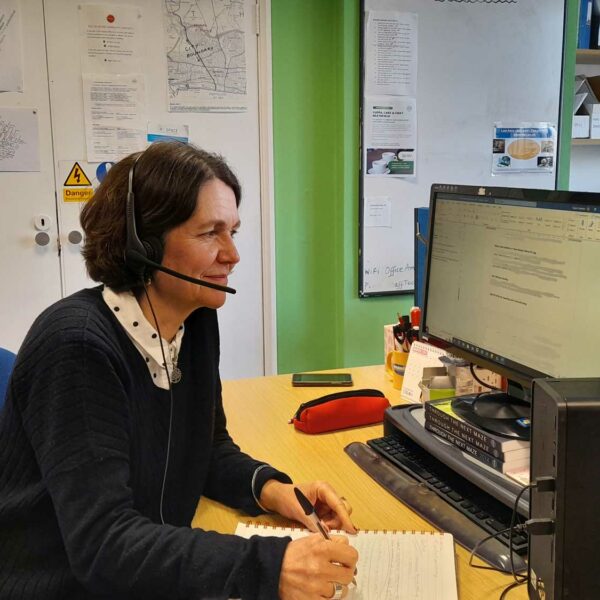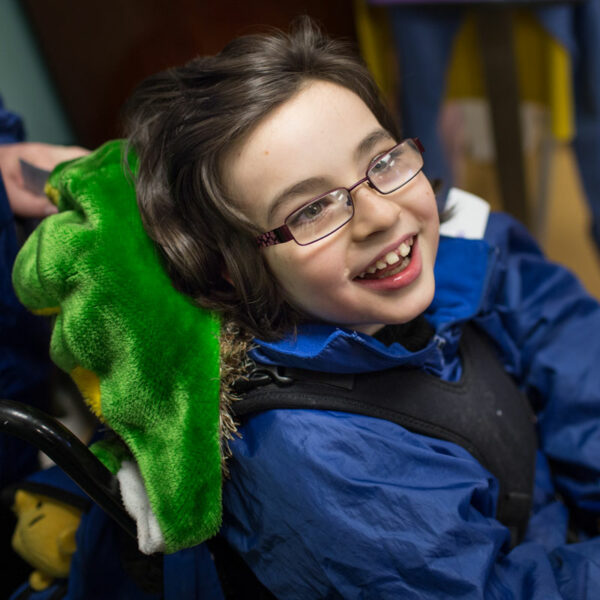Getting extra support with SEN in school or college
Children and young people with special educational needs and disabilities can get extra support in school to help them learn. This is usually called SEN support.
You can get lots of advice about getting the right support in school on this page, or you can book onto one of our free SENDIASS workshops about getting the right SEN support in school on our Events page.
What is SEN support?
SEN support is extra help given to children and young people in mainstream school or college specifically to help with their special educational needs. It is additional to (or different from) the support generally given to other children of the same age. You do not need a diagnosis to get SEN support.
Most children with special educational needs can have their needs met by SEN support and should not need an Education, Health and Care Plan (EHCP).
Extra SEN support may also be given in nurseries and pre-school settings. Read more about support with SEND in early years education.
Who gets it?
Many children will get extra help at certain times in their education without being described as having special educational needs. Teachers are expected to adapt lessons and activities to suit each individual child. This process is called differentiation and is part of what is known as a ‘quality-first’ teaching approach.
If your child has a lot more difficulty learning than other children their age, however, they may be identified as having special educational needs and/or disabilities (SEND). This could be because they have a learning difficulty, a physical/sensory disability, difficulty with communication or with their social, emotional or mental health. Children or young people with SEND may get extra support in school to help with their learning and this is called SEN support.
Though some children’s special educational needs are clear from an early age; for many their difficulties only become obvious when things don’t go as expected at school. For a few their needs arise suddenly, perhaps after an accident, or emerge at secondary school or even at college. If you feel that your child has difficulties that are not fully recognised by their school or pre-school, or that they aren’t getting the help they need, the first step is to speak to your child’s teacher, the special educational needs coordinator (SENCO) or the head teacher.
Read more about Getting a diagnosis.
Watch our SENDIASS video about getting the right support in school for your child's SEND:
What the law says
The SEND code of practice: 0 to 25 years is statutory guidance which sets out how the needs of children with SEND should be met in pre-schools, schools and colleges.
The Code identifies four broad areas of special educational need:
- communication and interaction
- cognition and learning
- social, emotional and mental health difficulties
- sensory and/or physical needs
Children and young people may have additional needs in more than one area.
The Code of Practice says:
- children and young people have a right to have their needs assessed and get support to meet those needs. This support does not have to be everything you might wish for, but schools and colleges must use their “best endeavours” to meet the special educational needs of their pupils.
- children and young people should get enough help to make progress that means they can achieve their best, become confident individuals and make a successful transition into adult life. If they don’t make progress, they should get a higher level of help.
- parents, children and young people should be closely involved at every stage. If the school or pre-school think that your child may have more difficulty learning, they should involve you from the start. And they must tell you if they have decided that your child has SEN, and that they should give them more, or different, help from the varied range of help they offer all children.
Types of SEN support
Support at a mainstream school can take many forms – study groups, one to one help, special equipment, etc. Some children may only get a little help or extra monitoring, whilst others have a complex package.
Schools often make use of teaching assistants to give much of the day-to-day help with SEN, but this should always be directed by a teacher or the SENCO.
SEN support is based on the needs of an individual child so you should talk to the SENCO (or equivalent) to identify the SEN support that may be provided.
The Local Offer website for your area gives further information about the support available in mainstream schools:
Brighton and Hove – How schools and other settings support children with SEND
How is SEN support planned and assessed?
Schools and colleges should follow a sequence of Assess, Plan, Do, Review to arrange and monitor your child’s SEN support:
- Assess – identify the child or young person’s needs. This process should involve the child or young person, the parents or carers and any other professionals working with the child.
- Plan – work out what support to offer and how. This might be a special programme of work, specific equipment, time with a teaching assistant or teacher individually or in a group. The child or young person, the parent carers and teachers should agree on the outcomes they expect to see from this support. This support and its outcomes are then written down in a plan.
- Do – the teacher or subject teachers put the plan into action, supported by the SENCO.
- Review – look at whether the support is working. Schools or colleges should meet with parents, and involve the child, every term, to look at what progress has been made towards the outcomes. Revise the plan, continue strategies that are working or change and introduce new strategies where needed.
 The same process is followed in early years settings like nurseries and pre-schools. See our information about Early years education.
The same process is followed in early years settings like nurseries and pre-schools. See our information about Early years education.
The Assess/Plan/Do/Review cycle should continue for as long as your child needs SEN support. If they do not make the expected progress, efforts should intensify. Schools may bring in expert advice to help assess your child in more detail or plan more, or different, support. As the parent, you should be involved at every stage. Schools must record the details of the SEN support on an additional needs plan or SEN support plan (which might be called something different in your school). The document should record the support to be given, who will deliver it and how often, as well as the outcomes that the support is meant to achieve. This SEN support plan will move with your child between schools or other settings.
By monitoring the progress your child is making towards their outcomes you can all see what impact the SEN support is having. For some children it may become clear that SEN support cannot offer enough. If so, you may consider applying for an education, health and care needs assessment that can lead to your local authority issuing an Education, Health and Care (EHC) plan. Copies of the additional needs or SEN support plan are useful evidence to submit if you make a request for an assessment. Read our section on EHC Plans (EHCPs).
The school should be in regular contact about SEN Support, providing an annual report on your child and a face-to-face meeting at least every term.
How much support can my child get?
Children can get a significant level of extra help on SEN Support, including one-to-one help for several hours each week if that’s what helps them best. There is no fixed package of support – provision should be matched to the need of the child and the outcomes identified. The amount of support can vary greatly, according to the need of each child, and develop over time as their needs and outcomes change.
Funding for SEN support
Schools receive additional support funding (ASF) annually, an amount of money sometimes called their “delegated” SEND budget. How much a school gets is based on a formula that should roughly match the proportion of children with SEN they have compared to other schools. This is meant to fund the special educational provision for children on SEN Support. The assumption is that schools will spend varying amounts on children depending on their needs, but that they are expected to be able to cover up to £6000 worth of support for individual children with the greatest needs. For most children the cost will be far less.
SEN support services
Brighton & Hove and East Sussex provide learning support services that schools can call on to provide more specialist advice and support for children and young people with SEND. In East Sussex, much of this specialist support comes from the Communication, Learning, Autism Support Service (CLASS) and in Brighton and Hove, it’s provided by the Brighton & Hove Inclusion Support Service (BHISS).
Both BHISS and CLASS work closely with school staff to assess children and young people with SEND, and to develop plans and strategies to help them learn and enjoy school. They also run training courses for teachers and teaching assistants on specific conditions like autism or speech and language issues and offer advice and consultation about specific pupils. Schools will usually buy in these specialist services from their individual school budgets.
Specialists from BHISS and CLASS may also work directly with children and young people in school or other settings. And they support and advise parent carers of children with specific conditions like autism or communication issues, either directly or via training courses and coffee mornings.
Other specialist services that may support your school age children with SEND include occupational or speech and language therapy, sensory needs or services that focus on supporting change to behaviour that challenges or skills like reading or acquiring English as a second language.
What if SEN support is not working?
If your child has been getting SEN Support by properly trained staff for a while but they are still not making progress at school, you should raise your concerns at one of your three face-to-face meetings during the year.
Schools have a legal duty to use their best endeavours to meet your child’s needs and further investigation by an outside professional may be required. This may be the time to ask for your child to be seen by an Educational Psychologist to investigate why your child is not making progress and/or whether their needs have not been identified.
If it looks like your child will need help above and beyond what the school can provide from its own resources, they may need an education health and care plan, often called an EHCP. Only a small minority of children move onto this higher level of special educational support, but the EHCP is a legally binding document which may provide additional resources for your child’s support.
See our section on EHC assessments and plans.
Children with disabilities and/or medical conditions
There are some children with medical conditions who don’t have SEN but do need extra support to be able to attend school and be safe and well while they are there. Schools are legally required to make arrangements to support them. Schools should agree an individual healthcare plan with you, setting out how your child’s health needs will be met, naming the staff who will deliver this support and identifying any staff training that is needed.
Read more about Health issues in school.
Even when they may not have special educational needs, disabled children are entitled to reasonable adjustments to all aspects of the school. There is no legal definition of “reasonable” but you should expect school to be flexible in its approach and to discuss the support your child may need put in place. It could include the provision of equipment, additional staff contact, changes to teaching and learning strategies moving to a more accessible classroom, or other physical changes to the school.
Get advice from Amaze
Our SENDIASS advice team can give you one to one advice on anything to do with education and your child or young person’s special educational needs and/or disabilities (SEND).







